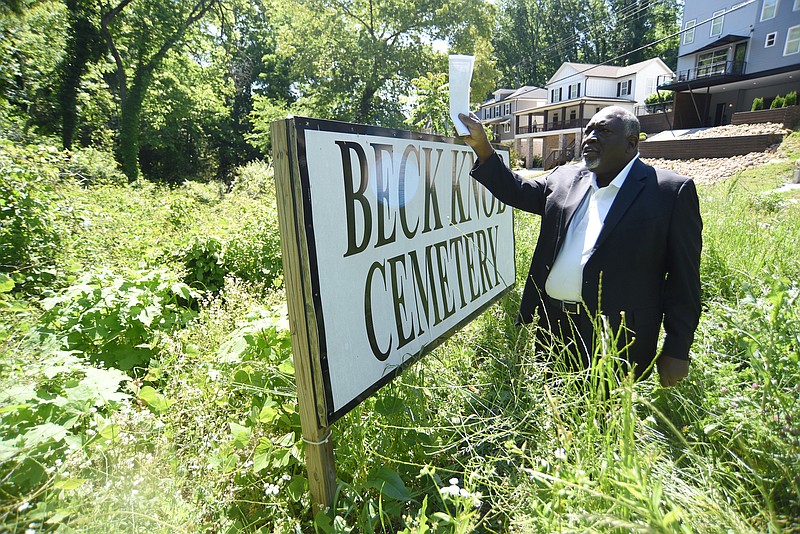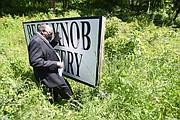A small sign identifying Beck Knob Cemetery stands in a tangle of kudzu, underbrush and briers near the corner of a lot at Dartmouth Street and Carrington Way, but there's no indication of its importance to Black history in Chattanooga.
Here and there a small yellow or red rose peeks out of the spring web of green foliage hiding the small gravestones that mark 42 resting places for the nearly 200 people believed buried there. A row of hollow steel fence posts stands along one side of the cemetery, just a few feet from a residential neighborhood built around 2015.
The historic site is one of four in the Chattanooga region nominated for placement on the National Register of Historic Places for 2021, but whether it makes the list or not Beck Knob Cemetery is believed by historians to be the first organized Black cemetery in Chattanooga. It holds graves dating back to the Civil War and earlier.
"Historically, cemeteries have been a key place for Black folks," said Gary James, member of Hurst United Methodist Church on Dallas Road, the deed holder of the Beck Knob Cemetery property. "When we came out of slavery, some of the first institutions that we established were churches, schools and cemeteries.
"Cemeteries provided a place where we could assemble and we could honor our dead and have a sense of community," James said. "It has great value in the community, and we just feel that partnering with the community around us, if we can get it on that historic registry we can have something in the community that not only can honor the dead but that all of us can be proud of."
Beck Knob Cemetery
Beck Knob Cemetery is the first burial ground established for African Americans in Chattanooga, according to nominating documents submitted to the Tennessee Historical Commission for the cemetery's placement on the National Register. The one-acre site is on the south side of a steep hill in North Chattanooga bound by partially wooded residential lots, an undeveloped lot and two bordering streets.
"Oral tradition in the North Chattanooga African American community is that Black people who died circa 1865 in the Union army contraband camps of North Chattanooga were the first burials," nomination documents state. "Officially deeded to a local African American church congregation - now known as Hurst United Methodist - in 1888, the documented burial period of Beck Knob Cemetery is 1884 to 1952."
Visual surveys of the cemetery combined with research into city and state death records indicate there are at least 188 people buried there, according to records. But there could be more.
(READ MORE: Mines: Beck Knob Cemetery is a treasury of the past in North Chattanooga)
"This is believed to be a conservative number, as it does not include individuals buried at Beck Knob before it was officially deeded to the church, nor does it include burials that took place in the late 19th and early 20th centuries that may not have been captured by official records," documents state.
There are about 42 existing gravestones or markers and the people buried there "belonged to the working class employed as domestic workers and laborers for private families or in Chattanooga's manufacturing plants, though there is a notable exception in Chattanooga pharmacist Dr. Chester Lee Sharpe who was interred in 1942," documents state.
In 2009, a local Eagle Scout worked to clear the cemetery and map and photograph the stones, and local historian E. Raymond Evans included a hand-drawn map of the cemetery and photographs of the stones in his 2012 work "Bright Memories: Beck Farm, Camp Contraband, and Hill City."
In 2015, developer Green Tech Homes uncovered part of the cemetery during construction of a 10-acre neighborhood with 46 homes in the 800 block of Dartmouth Street and stopped work until after an archaeological assessment and redesign of plans.
In 2018, Beck Knob Cemetery, along with two other historic African American cemeteries, Pleasant Garden and Hardwick, became beneficiaries of the city of Chattanooga's new African American Cemetery Preservation Fund, designed to aid volunteers in maintenance and preservation, documents state.
On Friday, James stood near the old fence line and looked up the slope where some of his grandmother's side of the family are buried.
His grandmother's family members - the Waltons - are buried at Beck Knob and James spent time there maintaining those graves as a child growing up on nearby Dallas Road, the 73-year-old recalled on Friday.
James and other church members and Beck Knob Cemetery families want to get the site cleaned up, again, for the church's 138th anniversary celebration in August. And he's hoping to celebrate a National Register listing along with the church's birthday.
Church members cleaned the site up in 2018 and 2019, but the pandemic halted cleanup efforts in 2020. Kudzu and underbrush grew up rapidly over the past two rainy years, and it's time to do it again, James said.
"I think once we get on that registry I think it'll help us to line up more funds so we can do some of the long-range work," he said. "The African American Cemetery Preservation Fund, there's a small amount in there, and we plan to use that to help clean up here."
James said he hopes cemetery families can get together for the church's anniversary celebration in August to honor the ancestors who endured so many trials, and he wants it to be ready for visitors.
"But the main focus is to help maintain the integrity of the cemetery," he said.
James said graves there date as late as the 1950s, and he can remember attending a funeral there as a child. He said there were a number of church and cemetery family members who worked on upkeep, but it was the North Chattanooga Garden Club that really made the most impact in recent decades.
"In 1968, that's when the North Chattanooga Garden Club, who were the women who had been maintaining the cemetery, decided to name it 'Beck Knob' in honor of the Becks who gave us the property," he said. Before that, older historical records only named the site "Negro Cemetery."
Originally, the cemetery was part of Joshua Beck's farm. Beck was a prominent landowner and pioneer in Hamilton County in the late 1800s who founded the cemetery as a place for servants and the family members of slaves to be buried, according to newspaper archives.
(READ MORE: Downtown Chattanooga church added to National Register of Historic Places)
The headstones that can still be found, some of them broken into two or more pieces and others that have been moved from their original positions, mostly face west with the burials sites oriented east-west, documents state. The majority of existing stones are from the 1920s and 1930s, while the oldest marked graves are from the early 1900s.
Former church member Velma Fields several years back led one of the more recent efforts to clean up the cemetery and seek a listing on the National Register. James said when Fields died the effort lost its steam until 2015, when Green Tech brought attention to the cemetery again.
Green Tech has agreed to help put the entrance to the cemetery back in place and erect a wrought iron fence around it, James said. Two concrete block pillars were damaged by the construction but the pieces are still near the entry and the new entrance will likely be in the same place or very near, he said.
Beck Knob's nomination - as well as the other three nominees in the Chattanooga area - goes before the State Review Board on Wednesday for a vote, but the results usually aren't announced for weeks, according to Chattanooga's historic preservation expert.
OTHER 2021 TENNESSEE NATIONAL REGISTER NOMINEES
* Twinton Fire Lookout Tower in Overton County * Overton Park Court Apartments in Shelby County * Chuck Swan Fire Lookout Tower in Union County Source: Tennessee Historical Commission State Review Board agenda for May 19, 2021.
Melissa Mortimer, the city's historic preservation planner, said nominees that are approved at the state level are next submitted to the National Park Service's "Keeper of the National Register," who will ultimately decide whether listing on the register is appropriate.
The listing protects historic resources from "federal undertakings" such as cellphone tower or similar federally regulated installations or construction, she said.
Mortimer, who helped write the nomination for another of this year's nominees, said Beck Knob's listing on the register "is a great nomination and MTSU [Middle Tennessee State University] does great work and they have specialists in cemeteries that worked on that nomination."
"I think it's a shoe-in,"she said Friday.
Mortimer said the listing provides grants through the National Park Service's Historic Preservation Fund. She said a qualifying nonprofit organization or a government can apply for the funds on an historic site's behalf, something James hopes could help fund perpetual maintenance of the cemetery.
Other nominees
Other notable sites in the Chattanooga region also are being considered by the State Review Board.
Price-Evans Foundry site
Also in Hamilton County, the Price-Evans Foundry site on South Holtzclaw Avenue, also known as Lucey Boiler, is directly across from the National Cemetery and now being developed as a residential and commercial space, according to developer Southern Spear. Southern Spear officials didn't return a call seeking a comment on the nomination.
The site consists of five 1907-era buildings on almost five acres covering two city blocks on the edge of the Highland Park neighborhood, according to nomination documents. The structures there include a former main office building, a pattern building, a machine warehouse and a main foundry building.
Because they were vacant so long, the buildings have little of their original interiors left, document state. A fifth brick structure on the site described as "non-contributing" is a water closet building that originally was a bathroom facility later converted to an office. The modifications in the 1950s caused that building to lack historical significance.
Big Hill Fire Lookout Tower
In Marion County, 1947-era Big Hill Fire Lookout Tower is 60 feet high and made of skeletal galvanized steel. The tower sits atop Big Hill on the Cumberland Plateau at an elevation of 2,032 feet. It has an observation deck with a panoramic view of the surrounding landscape, according to nomination documents.
A small cabin, a utility building and a crew house, all also dating back to 1947, are included in the nomination as contributing buildings, documents state. The tower and its view of the forested surrounding terrain have changed little in the past seven decades and the property's characteristics retain their integrity.
T-201 Aircraft Hangar
In Coffee County, the nominee is a T-201 aircraft hangar built by the U.S. Army Corps of Engineers in 1941 that harks back to the community's military past, according to documents. The World War II-era hangar stands at what is now the Tullahoma Regional Airport and is remarkable for its facade of 10 massive sliding doors, roof line, fenestration patterns, metal cladding and the large open floor plan that was historically used for aviation instruction and the storage of aircraft.
Now a part of a nearly $1 million project, the facility is being renovated to hold three new companies, provide hangar space for corporate and general aviation aircraft and possibly house a repair station. An existing flight school on the field will be housed there, developers said in January.
Contact Ben Benton at bbenton@timesfreepress.com or 423-757-6569. Follow him on Twitter @BenBenton or at www.facebook.com/benbenton1.

